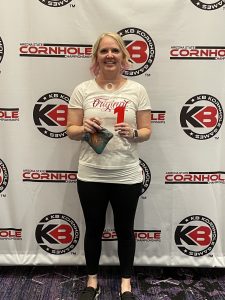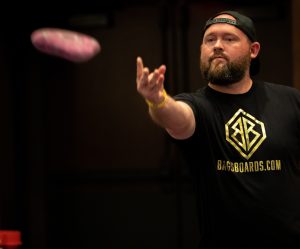- Slug: Sports-Rise of Cornhole, 2,000 words.
- 4 photos available.
By Ian Garcia
Cronkite News
PHOENIX – If any moment in this sport’s ascent turned heads, it was a weekend in August of 2017, when tournament competition on ESPN2 attracted better ratings than Major League Baseball on TBS and FS1, and the final stage of the Tour de France on NBCSN.
The sport? Cornhole.
While some may view it as a simple backyard activity – where competitors throw bags filled with corn or resin at a raised board with a hole in the far end – cornhole has grown and attempted to stake its claim as a legitimate sport over recent years.
“I think we’re just at the tip of the iceberg,” said Todd Kisicki, owner of KB Kornhole Games and a national director with the American Cornhole League (ACL).
It feels that way. Tournaments are now broadcast on ESPN, and a new audience came aboard in the summer of 2020 when the COVID-19 pandemic forced major sports leagues to suspend their seasons.
Now the sport’s top organizers have a loftier goal in mind: the Olympics.
Sport on the rise
While teaching at Arizona State University, Kisicki decided to start KB Kornhole Games, renting out cornhole boards to people. After running a fundraiser event, Kisicki realized that he really liked the business side of the sport.
Business took off when he began running events in the Valley as more people became interested in playing both recreationally and competitively. Needing to balance time between both jobs, Kisicki was forced to choose which path he wanted to pursue.
“We started (KB Kornhole Games) in 2015, and I was kind of doing it on the side when I was at ASU,” said Kisicki, who in 2012 completed his Ph.D. in Educational Technology . “A year and a half in, it just got to a point where I couldn’t devote all my energy to one or the other. I had to make a decision to see which one I was more passionate about. After 15 years in education, I decided to kind of take a chance on myself and go with cornhole.”
Kisicki left his teaching position at the end of 2016 to focus on growing the sport of cornhole locally.
His role would eventually expand beyond Arizona.
With the ACL, Kisicki oversees hundreds of directors and organizes professional events for players around the country.
According to Kisicki, there are over 100,000 registered players in the ACL database, and there could be anywhere from 10,000 to 50,000 active players throughout the season.
The Phoenix and Arizona cornhole community is one of the largest in the country.
KB Kornhole Games held its state championships at Arizona360 Sports & Fitness Complex in Phoenix in 2018 and 2019 before moving to Harrah’s Ak-Chin Hotel & Casino in 2021 after the 2020 event was canceled because of the COVID-19 pandemic.
Player turnout at the Arizona State Cornhole Championships has grown each summer, and more than 450 players competed in this year’s event, making it the biggest one in the country by far.
“It’s been awesome,” ACL pro and 2021 state champion Doug Zafft said. “I’ve been playing for 11 years competitively. I think back 10 years ago to what a tournament was, and it would just be in someone’s yard. Once Todd got involved, we were hosting tournaments in (Ability360 Sports & Fitness Center) and filling this place up.
“It’s great to see and just continue to grow and grow and get more players at all levels. It’s been important to have the new base of players come in to get started, but there’s a pathway for them to go all the way up to advanced and get to the pro ranks.”
With increased participation and the challenge of finding venues big enough to hold events, Kisicki decided to work on opening up a cornhole-specific venue in the area, something he believes the sport will see more of as groups continue to grow.
Naturally, with a large sport comes an integral part of showcasing it to an audience: television.
ESPN began televising cornhole in 2017. Event coverage was watched by hundreds of thousands of people, earning a larger viewership than many other popular events.
Cornhole participation sees an uptick every time an event is broadcasted on national television, Kisicki said. It has reached a point where the inaugural events with a few dozen players, a “big deal” at the time, now seem miniscule compared to the hundreds – and sometimes even thousands – of people who show up to compete at some of the larger events across the nation.
Now, 256 professional players around the country are participating in a season with a whopping $1 million prize pool.
“It’s so exciting to be able to see this,” ACL pro Kevin Nellis said. “When I started, the game wasn’t even really doing that. I kept telling my friends that I’m getting to play at the advanced level, then, all of a sudden, it’s not just the advanced level anymore, it’s the chance to play on national TV for serious money and getting potentially paid to play a sport that we absolutely love playing. It’s just fun.”
In a strange turn of events, the pandemic turned out to be one of the best things for cornhole.
While many sports were forced to postpone their seasons, cornhole was able to work its way around it as a non-contact sport that is physically distanced.
As a result, the sport received a ton of airtime while other sports leagues were on hiatus, exposing audiences hungry for some sort of competitive action to the world of cornhole.
“I think it will continue to gain popularity,” Zafft said. “The more it’s on TV and seen consistently, I think more and more people will say, ‘Wow, I can go play these tournaments nearby, maybe win some money, have some fun and meet some new people.’ It’s just going to continue drawing more people to the sport, and hopefully driving more and more bigger tournaments.”
Now, Kisicki wants to pounce on the opportunity and maximize growth.
He recently hired a national director at ACL for high school development, focusing on getting cornhole into schools around the country. Additionally, USA Cornhole will be responsible for developing the sport at the youth level.
With continued growth, Kisicki and the rest of the cornhole community has one goal in mind: reaching the Olympics.
The 2020 Tokyo Games saw the debut of several sports, including skateboarding, surfing, karate and sport climbing.
Zafft was drawn in by the competitive aspect of cornhole because of his background as a former NCAA Division I swimmer at the University of Cincinnati and Olympic Trials qualifier. Now, he may one day find himself competing to qualify for the Olympics once again, this time in the sport of cornhole.
Hoping to have cornhole reach Olympic heights, Kisicki has worked in the international development of the sport, speaking with representatives from around 25-30 countries about the possibility of affiliating with the ACL and starting their own affiliate in their own countries.
“That’s where we’re striving,” Kisicki said. “The CEO of the ACL is very invested in seeing that it gets to the Olympics, and that’s part of my role with the international community: growing it and getting them to start their federations so that we can one day get it to the Olympic level.”
The cornhole community
Many in the cornhole community got involved in the same way: playing in the backyard or at a bar with some friends.
The sport has developed a strong community over the years.
“To be able to see people meet and grow and get comfortable with each other and make new friends is pretty amazing,” Kisicki said. “As human beings, we all want to feel part of a community. As you get older, once you get out of college, it’s sometimes harder to make friends. Having that area where you can go or that activity that you can do with other people that enjoy doing it as well, that community part of it is a big thrill for me.”
Nellis started playing the sport with some friends in the backyard at a Christmas party. One of his neighbors saw there was a local tournament being held, and they decided to compete in it.
Initially, Nellis showed up to events without his own set of bags, which was required to compete. As a result, he had to borrow bags from some of the locals before buying his own set once he “got more and more addicted” to the sport.
With a friend at his side, Nellis became entrenched in the world of cornhole.
“We just absolutely fell in love with it at that point,” he said. “The people are what drew us to it (along with) the competitive nature. We both have lots of sports backgrounds, but being able to compete and not be sore the next day was a nice thing. That’s when we started really getting serious about it.”
The cornhole community does not only come together when events roll around. They are there for each other whenever and wherever necessary.
“After the first month, I felt like I was part of something bigger,” Nellis said. “When it really hit home was when a few people had a tragedy happen in the family, and the cornhole community came together in days. Everybody from every side of town – from the east, west, down south in Tucson – they all came together as a community to help every individual person whether they knew them or not. Everybody is willing to pitch in on whatever level that they can, and that’s when you really know that you’re part of something a little bit bigger than just cornhole.”
While participation has continued to reach impressive levels, the community is still a bit niche and has formed a space for those involved to come together regardless of skill level.
“It’s like a big family,” said Jillian Willis, 2021 state champion and female player of the year. “Everybody knows everybody. I actually see cornhole people more than I see my actual family. It’s a great community. Everybody is very friendly and very welcoming to new players.”
One fascinating aspect of cornhole is its wide age range among players.
While players mainly fall in the 25-49 age range, there are pros as young as 11 and some all the way up to their 70s and 80s, Kisicki said.
The sport crosses generations, and people are encouraged to get involved as early as they would like.
“It’s a family thing,” Willis said. “A lot of people think that we’re always out at bars playing. A lot of times, we’re at golf clubs, clubhouses and stuff like that. Almost all the tournaments have junior levels, and the kids can come play against the adults. It is a very family-oriented sport. Anybody can play.”
New or younger players may feel a bit intimidated at these large events, but the community has always been supportive and welcoming of fresh faces no matter the issue.
“I try to offer any advice I can,” Zafft said. “I don’t try to keep any secrets of how I hold the bag or what I do to consistently get in the hole. I just try to be as friendly and helpful as I can to the cornhole community, and I think it is a great community if you talk to any player. The game itself is fun, but the community is an aspect that everybody enjoys. It’s very friendly, we all get to know each other and travel together, and it’s just a lot of fun.”
Although it remains to be seen just how far the sport can go, cornhole has developed a strong community both locally and nationally, and they hope to continue to drive participation in the future.
“The people are the limit,” Nellis said. “At the current rate we’re going, it’s going to be up there with anything else. People are hoping to get it to the Olympics. I don’t think it’s going to really get that far, but it’s going to be a sport that everybody plays growing up. Hopefully, it becomes another major game like everything else.”
For more stories from Cronkite News, visit cronkitenews.azpbs.org.



